

Multidisciplinary Association for Psychedelic Studies - MAPS. Jon Ronson: Strange answers to the psychopath test. Darcey Bussell: Dancing to Happiness. The rise and fall of LSD: Fascinating documentary on acid. The rise and fall of LSD: Fascinating documentary on acid.

MP Taking Mescaline Panorama 1955. The Danish have designed a simple way to cope with loneliness. Toad, a 20-year-old Danish woman living in Copenhagen, has been lonely her whole life.
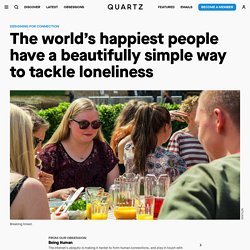
She is autistic, and as a child, did not have any friends. When she moved from the country to the city, not much changed. The D Factor Might Be the Personality Trait Behind All the Evil in the World. So here's a question: If you could find out your own D factor, would you want to?
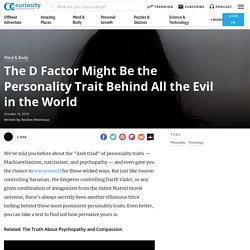
Good/bad news — you can. Anyone can still participate in the study — if they're willing to explore the dark sides of their personality. You can choose three different versions of the test depending on how much time you've got: a 30-question quiz if you're in a rush, a 60-question quiz for a more precise answer, and a 90-question quiz with an even more exact result. Neuroplasticity. What Makes the Ketamine-Based Drug for Depression So Different? On Tuesday (March 5), the U.S.
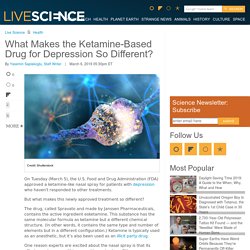
Food and Drug Administration (FDA) approved a ketamine-like nasal spray for patients with depression who haven't responded to other treatments. But what makes this newly approved treatment so different? The drug, called Spravato and made by Janssen Pharmaceuticals, contains the active ingredient esketamine. Your Brain Treats Hunger for Knowledge Like Hunger for Food. Modafinil is the first confirmed drug that makes you smarter. Though initially made for narcoleptics (people having trouble sleeping), many soon caught on that modafinil can enhance cognitive abilities.

Right now, it’s a favorite among students who use it when preparing for exams with visible results, they claim. But modafinil isn’t the first such “smart drug” we’ve come across. It’s likely that you’ve seen some TV or internet ads marketing ‘smart pills’ that supposedly enhance cognitive abilities, but with mere anecdotal evidence backing it up. In contrast, modafinil really seems to be a legit smart drug, according to a systematic review of reports documenting the effects of the drug. The meta-analysis was made by a team at University of Oxford and Harvard Medical School.
Seratonin. Oxytocin. Peptide hormone and neuropeptide Oxytocin (Oxt) is a peptide hormone and neuropeptide.
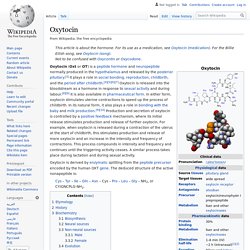
Oxytocin is normally produced in the hypothalamus and released by the posterior pituitary.[3] It plays a role in social bonding, sexual reproduction, childbirth, and the period after childbirth.[4] Oxytocin is released into the bloodstream as a hormone in response to stretching of the cervix and uterus during labor and with stimulation of the nipples from breastfeeding.[5] This helps with birth, bonding with the baby, and milk production.[5][6] Biochemistry[edit] Biosynthesis[edit]
10: Etiquette Laughter - 10 Different Types of Laughter. At the end of a long day, you find yourself in the elevator with your boss.
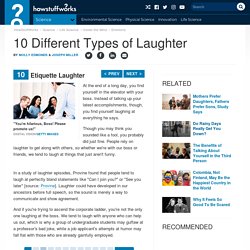
Instead of talking up your latest accomplishments, though, you find yourself laughing at everything he says. Though you may think you sounded like a fool, you probably did just fine. You Might Have the Most Common Form of Synesthesia. "Some people hear what they see.
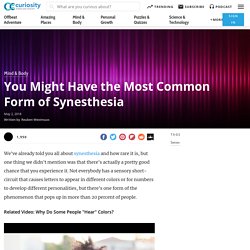
Car indicator lights, flashing neon shop signs, and people's movements as they walk may all trigger an auditory sensation," study author Dr. Elliot Freeman said in a press release. "We think that these sensations may sometimes reflect leakage of information from visual parts of the brain into areas that are more usually devoted to hearing. " Your Drunk Self May Actually Be the Real You. "We were surprised to find such a discrepancy between drinkers' perceptions of their own alcohol-induced personalities and how observers perceived them," said lead author Rachel Winograd, a psychological scientist at University of Missouri, in a press release.
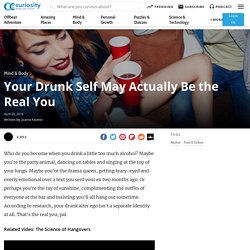
"Participants reported experiencing differences in all factors of the Five Factor Model of personality, but extraversion was the only factor robustly perceived to be different across participants in alcohol and sober conditions. " As for why you feel like an entirely different being when you've been a bit overserved? Probably just the placebo effect. If you have it in your head that tequila makes you wild or wine makes you emotional, you'll make those expectations come true all on your own. Kind of impressive, actually. The 'real you' is a myth – we constantly create false memories to achieve the identity we want. We all want other people to “get us” and appreciate us for who we really are.
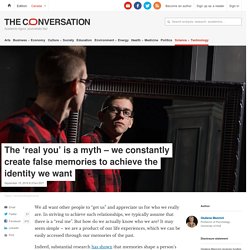
In striving to achieve such relationships, we typically assume that there is a “real me”. But how do we actually know who we are? It may seem simple – we are a product of our life experiences, which we can be easily accessed through our memories of the past. Narcissist, Psychopath, or Sociopath: How To Spot The Differences. Magic Mushrooms Could Be the Future of Antidepressants. Horizon Do You See What I See Part 1-4. How sheds can help men stave off loneliness after retirement – according to our new research. When people hear the word shed, they may think about a rickety wooden building at the bottom of a garden crawling with spiders, filled with old paint tins, a lawnmower and out-of-date weedkiller. It has also been associated with the term “man cave” – a space where a man spends time on his own, tinkering with junk or avoiding his partner. But our new research found there was more to the humble shed than meets the eye – mainly thanks to a revolutionary social programme which is fighting loneliness.
Loneliness is a key challenge for contemporary times and while it can be experienced by people of any age, it can impact older people particularly. The number of people over the age of 65 who live in the UK continues to increase and 3.6m older people live alone. Age UK found that for many older people their main source of activity is watching television.
Older men are more at risk of loneliness. Meeting friends and making things. This “city” for people with dementia is the future of memory care. Brain wellness club Field specializes in neuroenhancement. Teens who feel down may benefit from picking others up. Think about the last time you helped someone out. Maybe you sent a supportive text to a stressed-out friend or gave directions to a lost stranger. Mental health: ASMR videos could be a new digital therapy. You may know “ASMR” as the niche genre of YouTube video which people watch on tablets and laptops to help them relax, perhaps before bed or in the lull of a Sunday afternoon. These videos typically involve someone role-playing a mundane professional service, such as giving you a haircut, a massage, or booking you in for a doctors’ appointment.
The role-plays are usually performed in whispered voices, with the “ASMRtist” (the term for the creators of these videos) focused on building a feeling of intimacy and emphasising any crisp sounds or slow hand movements. But what exactly is ASMR, and why do people watch these videos? Although ASMR has been adopted as the name for these kinds of videos, it actually refers to the sensation that they are designed to induce: Autonomous Sensory Meridian Response. There's a psychological link between conspiracy theories and creationism. Ask a three-year-old why they think it’s raining, and she may say “because the flowers are thirsty”. Her brother might also tell you that trees have leaves to provide shade for people and animals. These are instances of teleological thinking, the idea that things came into being and exist for a purpose. Teleological explanations for natural phenomena are rejected by scientists because these explanations appeal to intentions.
But trees do not grow leaves and rain clouds do not drop water with an outcome in mind. It rains because of physics. Take teleology one step further, and you get Donald Trump, who thinks that global warming is an invention of the Chinese to make US manufacturing non-competitive. Teleological and conspiratorial thought share a number of features in common. Treating depressed children: how will history judge us? An investigative report by the BBC recently found that the number of antidepressants prescribed to children in England, Scotland and Northern Ireland has risen 24% over the past three years. Drugs may not be the most effective way to treat depression (more of which later), but pity the children who were treated for depression before antidepressants were invented. Bloodletting was the standard treatment for “melancholia” in ancient Greece.
Brains keep temporary molecular records before making a lasting memory. The first dance at my wedding lasted exactly four minutes and 52 seconds, but I’ll probably remember it for decades. 'Screen time' is about more than setting limits. The science of laughter – and why it also has a dark side. When you hear someone laugh behind you, you probably picture them on the phone or with a friend – smiling and experiencing a warm, fuzzy feeling inside. Tantalized by Train Wreck Reality Television. If you really want to remember a moment, try not to take a photo.
A very short guide to the most creative part of your brain. How one researcher is studying the unsettling phenomenon of déjà vu. Arenas and zoos can be overwhelming for children with autism. 4 simple exercises to strengthen attention and reduce distractibility. Why predicting suicide is a difficult and complex challenge. Mind molding psychedelic drugs could treat depression, and other mental illnesses. My research group has been studying the effects of psychedelics on neuronal structure and function, and we found that these compounds cause neurons to grow.
Anil Seth: Your brain hallucinates your conscious reality. How the smartphone affected an entire generation of kids. As someone who researches generational differences, I find one of the most frequent questions I’m asked is “What generation am I in?” If you were born before 1980, that’s a relatively easy question to answer: the Silent Generation was born between 1925 and 1945; baby boomers were born between 1946 and 1964; Gen X followed (born between 1965 and 1979). Next come millennials, born after 1980. Goethe on the Psychology of Color and Emotion. Jerusalem syndrome. The psychological benefits – and trappings – of nostalgia. How yoga is helping girls heal from trauma. The healing power of hip hop. The application of tDCS in psychiatric disorders: a brain imaging view. We face disability, disease and mental illness together.
Similarities and Differences Between Hoarding Disorder and OCD. The world is an amazing place. So why aren’t we happier? Hospital Rooms. Less Fear: how LSD Affects the Brain. You Shop Differently When You're Lonely. Reports. The mental health impact of major disasters like Harvey, Irma and Maria. Are religious people happier than non-religious people? People with depression use language differently – here’s how to spot it. Susan David: The gift and power of emotional courage. Helen Pearson: Lessons from the longest study on human development. Conversing with the Dead.
Why it’s time to lay the stereotype of the ‘teen brain’ to rest. What does taking a long hard look at yourself mean? What's the process? Where do you start? What promotes a change for the better? Can you train yourself to develop 'super senses'? Brain science should be making prisons better, not trying to prove innocence. Square Breathing: treatment for anxiety without using medication. Transcranial Magnetic Stimulation (TMS) at The Johns Hopkins Hospital in Baltimore, Maryland. MEMORY-LANE.TV- THERAPEUTIC & INTERACTIVE FILMS FOR DEMENTIA PATIENTS AND CAREGIVERS. Black Dog Institute. Samaritans. Lost Connections: Uncovering the Real Causes of Depression – and the Unexpected Solutions: Johann Hari: Bloomsbury Circus. CALM, the campaign against living miserably, is a charity dedicated to preventing male suicide, the biggest single killer of men aged 20-45 in the UK.
What if consciousness is not what drives the human mind? Pain Management - Hypnotherapy Directory. Why we secretly love to hate. Facts About Perception - Brain Games Article. Woebot - Your charming robot friend who is ready to listen, 24/7. Avatar Therapy Project. Jerusalem syndrome - Wikipedia. The 10 Best CBD Cannabis Strains According to Leafly Users. What's It Like To Smoke A High-CBD, Low-THC Strain? Festival of arts + science + people. The mental health impact of major disasters like Harvey and Irma. Mouth clicks used in human echolocation captured in unprecedented detail.
Daniel Kish: How I use sonar to navigate the world. Can Ayahuasca, the ‘sacred plant’ of the Amazon, help addiction and depression? The concept of schizophrenia is coming to an end – here's why. Manoush Zomorodi: How boredom can lead to your most brilliant ideas. The Brain with David Eagleman: What Is Reality - BBC Documentary 2016. The Wisdom of Psychopaths - Lessons in Life from Saints, Spies & Serial Killers by Professor Kevin Dutton. Future - The man who treats ‘phantom’ pain …with mirrors. Scientists Uncover How Our Brains Recognize Faces.
How Learning to Read Rewrites the Brain. Mapping the human brain connectivity. The psychological benefits – and trappings – of nostalgia. How using paint, pen on paper or song to revisit trauma helps us put it in the past. Video Games a Viable Treatment for Mental Illness?
How yoga is helping girls heal from trauma. Talking to Yourself: A Sign of Sanity. Magic Mushrooms Are Safer Than Alcohol, According To Global Study. The Psychology of Terrorism. Understanding terrorism.